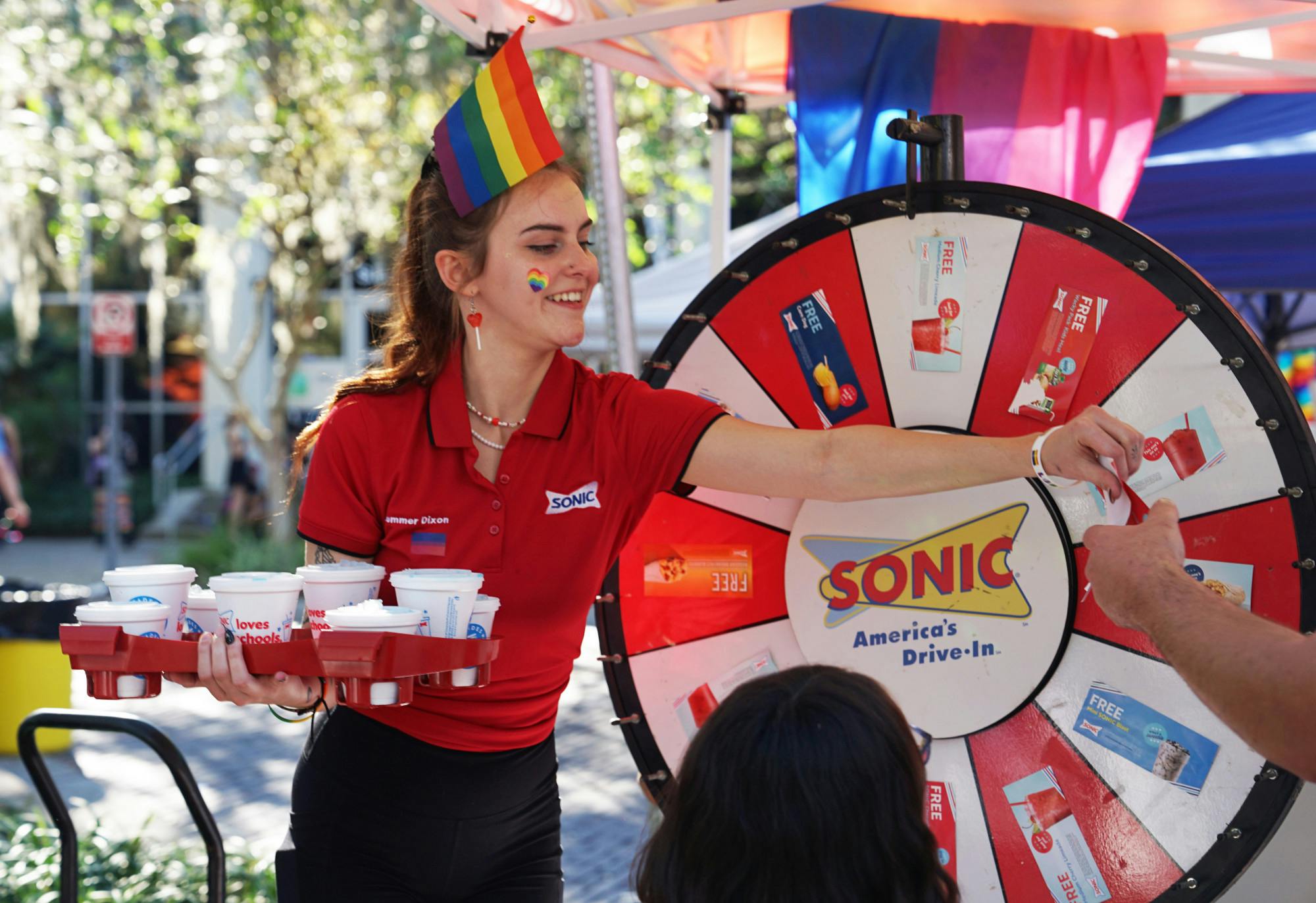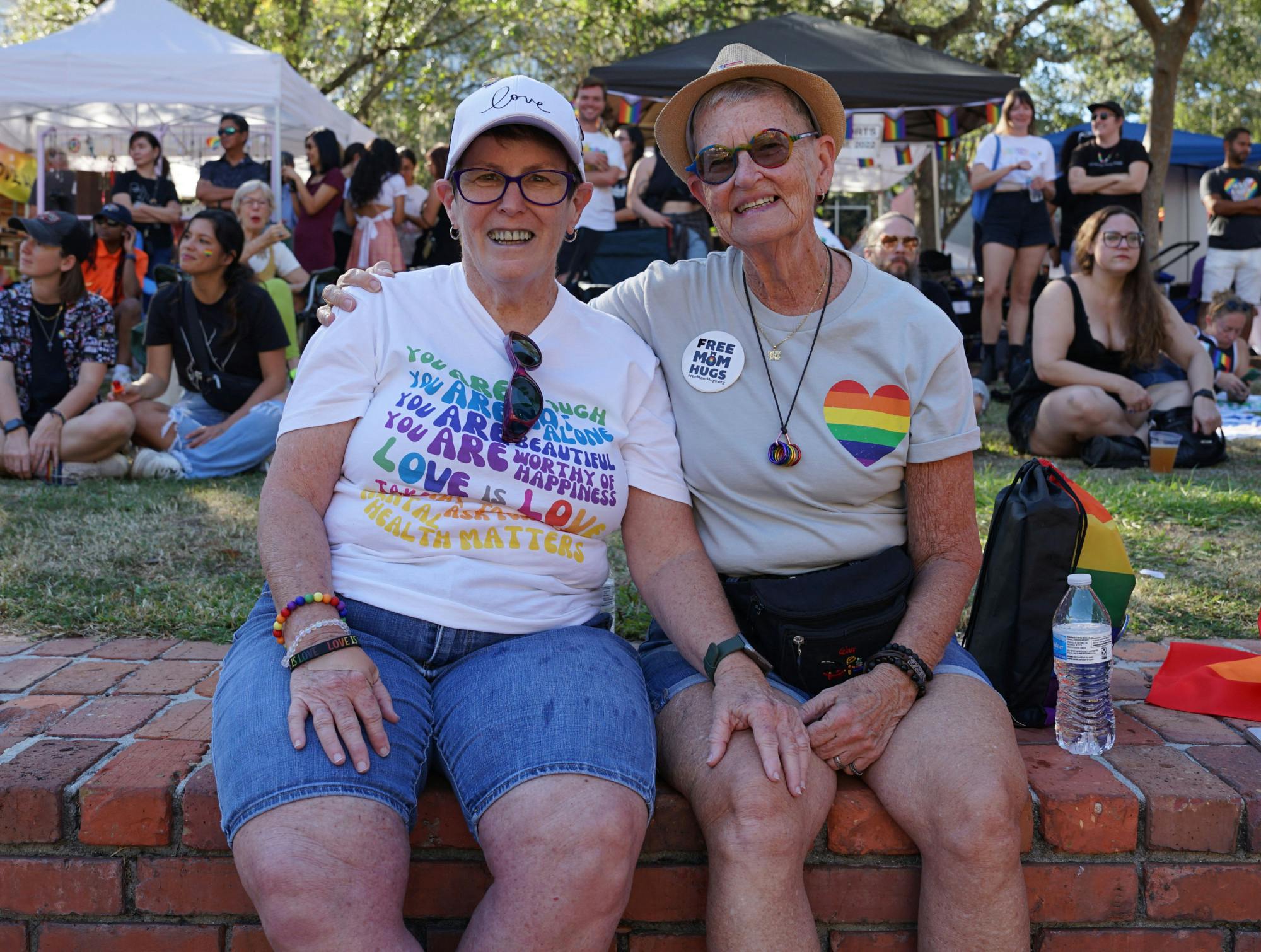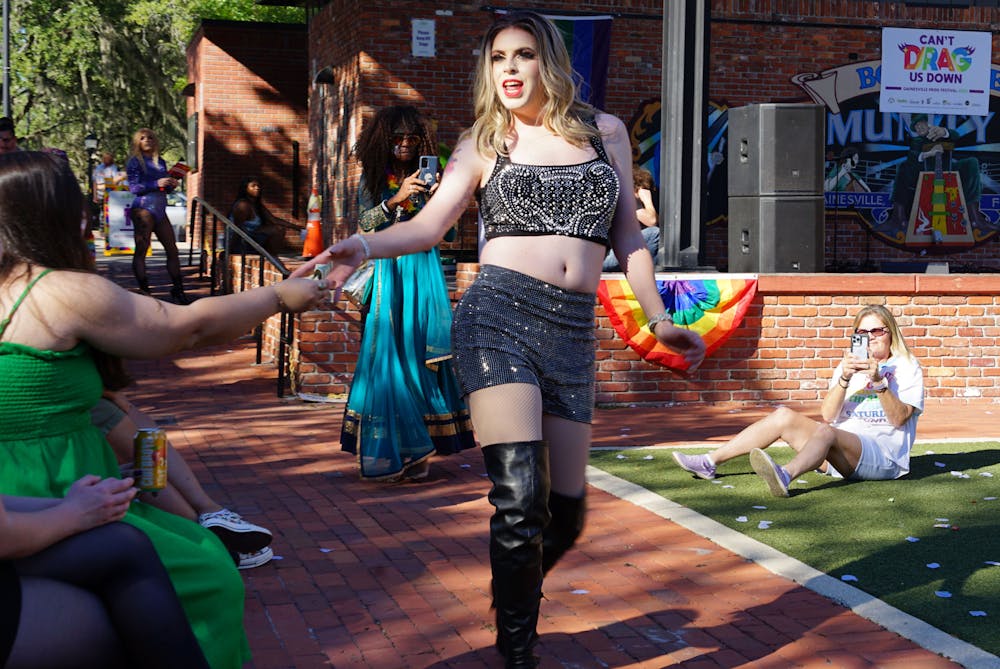Pride Month has been a celebration of the queer community since 1970, just one year after LGBTQ+ individuals fought against systemic injustices in the Stonewall Riots. Although the cause is commemorated nationwide in the month of June for over 50 years, Gainesville serves as one city celebrating Pride Month just a bit longer.
Gainesville Pride Festival brings thousands together
Despite being a city submerged under waves of orange and blue, Downtown Gainesville was repping the rainbow Oct. 21.
For eight hours, drag queens dipped, folding fans flipped and locals laughed with family, friends, neighbors and strangers as they celebrated Pride Community Center of North Central Florida’s (PCCNCF) 2023 Gainesville Pride Festival at East University Avenue’s Bo Diddley Plaza.
This year’s pride festival comes after Florida lawmakers passed in May the Senate Bill 1438, Protection of Children. The law bans government-funded facilities from allowing “adult live performances” where children are present. PCCNCF themed its pride parade, “Can’t Drag Us Down,” in response to this legislation, according to an Instagram post.
The organization’s pride days began Oct. 13 with a Halloween-themed drag show at First Magnitude Brewing Company and continued with events such as the 22nd Annual Spirit of Pride Community Awards, Alachua Queer History Gallery at Matheson History Museum and drag yoga and bingo at First Magnitude. But Oct. 21 marked one of the biggest Gainesville pride day events of ‘Can’t Drag Us Down,’ with nearly 5,000 LGBTQ+ community members and allies showing up.

Gerald Padgett, a 41-year-old community outreach director for Stonewall Sports Gainesville, was among the representatives of queer-focused groups in attendance at the event. Stonewall Sports is a non-profit sports league with 28 chapters across the country. Despite being a 14-year-old organization, its Gainesville chapter was founded just last year.
“[We focus] on those who felt like they were disadvantaged or they didn’t fit into sports,” Padgett said.
Padgett said the league’s focus on inclusivity and community over competitiveness has contributed to its nearly doubled membership in Gainesville since spring, with about 76 members registered at the time.
Kyria’s Crystals and Curiosities was just one of the numerous queer-owned pop-ups tabling at Bo Diddley Plaza. It is owned by 31-year-old Kyria Dion, who began her business in 2020 after the COVID-19 pandemic when she decided to leave her career in commercial real estate and pursue her passion to help people.
“[The queer community in Gainesville] is at least three times as big as it used to be,” Dion, who was raised in Gainesville, said. “I’m excited to see it keep growing too.”
The attendants of the festival were just as active as the vendors. Ivy Johnson, a 26-year-old recent master’s graduate of UF, explored shops, snacks and shows during her time at Bo Diddley Plaza.
“I just want to learn more about the local queer community in Gainesville, and see what’s all out there for support in the area,” she said. “I learned there’s a lot actually.”
She said she was shocked by the size and nature of Gainesville’s LGBTQ+ scene, citing it as “large” and “diverse.”
“There is power in numbers,” she said about the festival’s turnout. “The numbers are here, so we definitely have the power.”
Matheson History Museum debuts Alachua County’s queer history gallery
And these numbers have been around for decades, as the Matheson History Museum showcases in its gallery that chronicles Alachua County’s queer history.
Tom Kyne and Ken Hartis strolled through the Matheson History Museum’s newest exhibit and reminisced about marching down University Avenue years before. The vibrant shirts they once wore were perched in the glass display case alongside images and memorialized quilts of former friends.
“The whole movement here in town, it's come a long way,” Kyne said.
The Matheson History Museum’s temporary exhibit in the main gallery explores the history of Gainesville’s LGBTQ+ community. The display presents their story as early as the 1940s.
Display cases exhibit gay-themed magazine publications, nostalgic assorted buttons from the Doug Dankel Archive collected in the 1990s and quilts honoring people in the community who passed away. It was made possible by the Pride Community Center of North Central Florida’s donation of their archival materials. It will be on display from Oct. 14-28 from 11 a.m. to 4 p.m.

They also have an online exhibition titled “McCarthy Moment: The Johns Committee in Florida,” which explores how gay people were targeted and threatened in the 1950s by the Florida Legislative Investigation Committee, otherwise known as the Johns Committee. At the time, being gay was illegal. The exhibit tells the stories of students and teachers who were tormented and interrogated about their homosexual activities.
Kyne and Hartis, who are 62 and 60 years old, have been a couple since 1989 and lived through the events in the Matheson's exhibit. They recognized the people and stories portrayed in the exhibit.
Kaitlyn Hof-Mahoney is the curator-turned-executive director at the Matheson History Museum. With a passion for history, 30-year-old Hof-Mahoney wants to share it with the community.
“One of our taglines is, ‘This is your museum’, and we want this to be a place where everybody in our community can see themselves whether it's in our exhibits, our programs, our collections,” Hof-Mahoney said.
This exhibit was curated by Willett Hancock, 24-year-old visitor engagement assistant at the Matheson History Museum. As a gay person, they had an interest in researching gay history and recognizing trends in Florida.
“I feel like the homophobia that existed before 2016, when gay marriage was legalized, never really went away because all of those people are still alive,” Hancock said. “It's the same sort of resistance to diversity and free expression just presenting itself in a different way.”
Despite all the adversity the queer community has and is currently facing, they continue to embrace and be proud of who they are.
“Over time we've just become louder and more accepted,” Kyne said. “And I hate to even use that term because again, why wouldn't we be?”
Even family ties can be unraveled: LGBTQ+ family rejection
Society in general, even in countries with historically negative policies surrounding LGBTQ+ people, has become a more accepting place, according to a 2020 Pew Research study. External trends don’t necessarily apply to families though, and countless LGBTQ+ people face resistance from relatives when it comes to their identity.
Adrien Crater is not “mommy’s little girl” anymore. Well, they never were. They may have once appeared to be, like when they were born and the doctor confidently stamped a bolded black F on the birth certificate. Or when they tried out for female parts in every musical that their middle school put on.

In reality, though, for as long as they can remember, they’ve just been themselves. Feelings come first, words come later: nonbinary. Crater, a 19-year-old UF mechanical engineering sophomore, only began using gender-neutral pronouns during their first year of college. Previous attempts to do so had been somewhat unsuccessful.
A 2021 study from Ohio State sociology professor Rin Reczek shows that Crater is far from the only queer person whose family pushes back against their identity. Reczek, who uses they/them pronouns, analyzed the various ways LGBTQ+ adults navigate unaccepting family members, one of which is through conflict avoidance.
“It’s the ‘don’t ask, don’t tell’ military policy, applied to families,” Reczek said. “Family members can’t be outwardly homophobic if you don’t give them the chance to be, in essence.”
Conflict avoidance may feel safer for some LGBTQ+ people, but organizations like the Family Acceptance Project encourage the opposite: open, consistent communication with family members. EJ Hernandez, a 24-year-old gay man from California, spent his teenage years thinking communication with his family, especially his dad, would never be fully transparent.
EJ’s father, Ed Hernandez, was a true man’s man, he said. Captain of the football and baseball teams in high school and a proud former Marine, he looked at EJ’s unmasked femininity with a quiet sense of desperation for most of his life.
“When I saw this weakness in my son, it was very bothersome to me,” Ed said. “I would look at EJ and think, ‘Oh my gosh, if he’s gay, what am I gonna do?’”
When EJ came out to his parents at 14, Ed was forced to confront the question that had lingered in his mind for so many years. While he didn’t kick EJ out or ship him off to conversion therapy, a pseudoscientific practice that aims to “correct” same-sex attraction, Ed’s unhappiness didn’t go unnoticed.
“I was conscious that he didn’t really like certain things that I would do,” EJ said. “I did a lot in order to deny it and push it away because I just wanted to be accepted by my parents.”
No amount of denial changed the fact that he was gay, so EJ began looking for acceptance elsewhere. Years of bullying pushed him headfirst into groups of teens doing hard drugs and drinking, a trade-off EJ was willing to make to cultivate any semblance of community.
Elizabeth Husband, an 80-year-old Micanopy resident, has never met EJ. She does know countless people like him, though: LGBTQ+ youth anxiously seeking a place where they belong. Along with her fellow congregants at the United Church of Gainesville, she fights for a place where they can feel at home.
“The United Church of Christ, the national church, has what we call an open and affirming designation,” she said. “The [United Church of Gainesville] went through a process and then they voted to become an open and affirming church.”
As legislation like Senate Bill 1320, which prohibits classroom instruction on sexual orientation or gender identity until 9th grade, has progressed in Florida, UCG has focused its efforts on informing the children in its congregation.
Christina Guiriba founded Transcending Adolescence for that same purpose. Transcending Adolescence is a nonprofit designed to educate transgender and gender-nonconforming youth and engage them in physical activity outdoors.
Guiriba, a transgender woman herself, wanted to create an opportunity for trans youth that she never had.
“The entire curriculum was founded upon my lived experience as a trans woman of color in the South,” she said. “I took a long time to reflect on what made me a resilient trans adult. How did I make it, because there are some who don’t.”
More than “some” don’t make it, according to a 2022 study from researchers at Barry University. The study’s data indicates that 82% of transgender individuals have considered suicide and 40% have attempted, with the highest suicide rates appearing in trans youth.
Guiriba’s life’s mission is for Transcending Adolescence to be one of the stepping stones that transgender youth can follow into adulthood, and she has already seen the joy that the camp brings its attendees.
“The young people who come to us, many of them have never met a trans adult before. Some of them have never met another trans young person before.” she said. “There’s just nothing like the support of somebody who understands what you’re going through.”
Contact Jared Teitel at jteitel@alligator.org, Molly Seghi at mseghi@alligator.org and Bea Lunardini at blunardi@alligator.org. Follow them on Twitter @JaredTeitel, @molly_seghi and @bealunardini
Molly Seghi is a first-year journalism major at UF and a Fall 2023 Avenue Reporter. When not writing or journaling, she can be found at a live music event or working on her podcast “An Aural Account.”
Jared Teitel is a third-year journalism major, and this is his second semester as an Avenue reporter. In his free time, he enjoys running, shopping, and drinking coffee.






